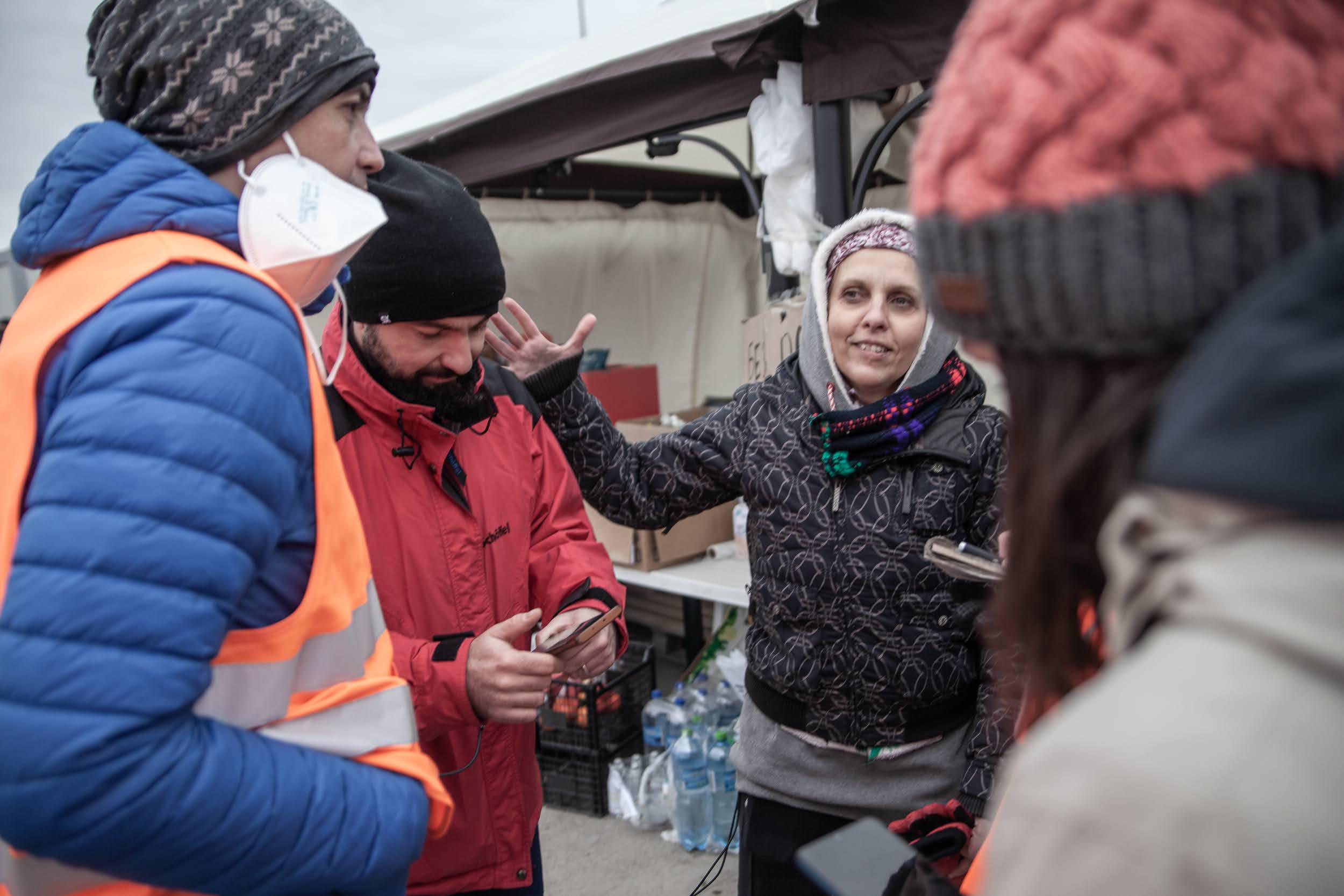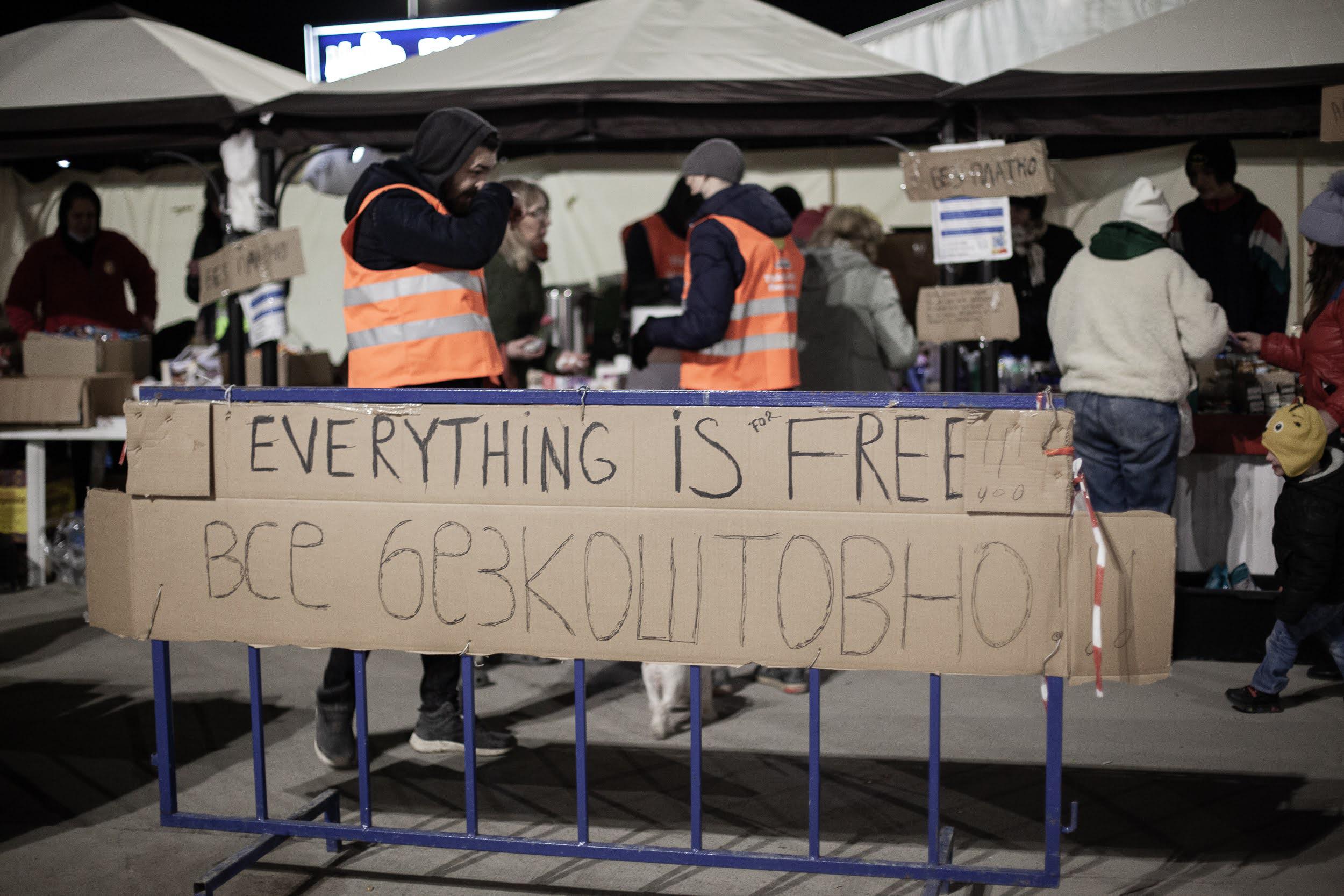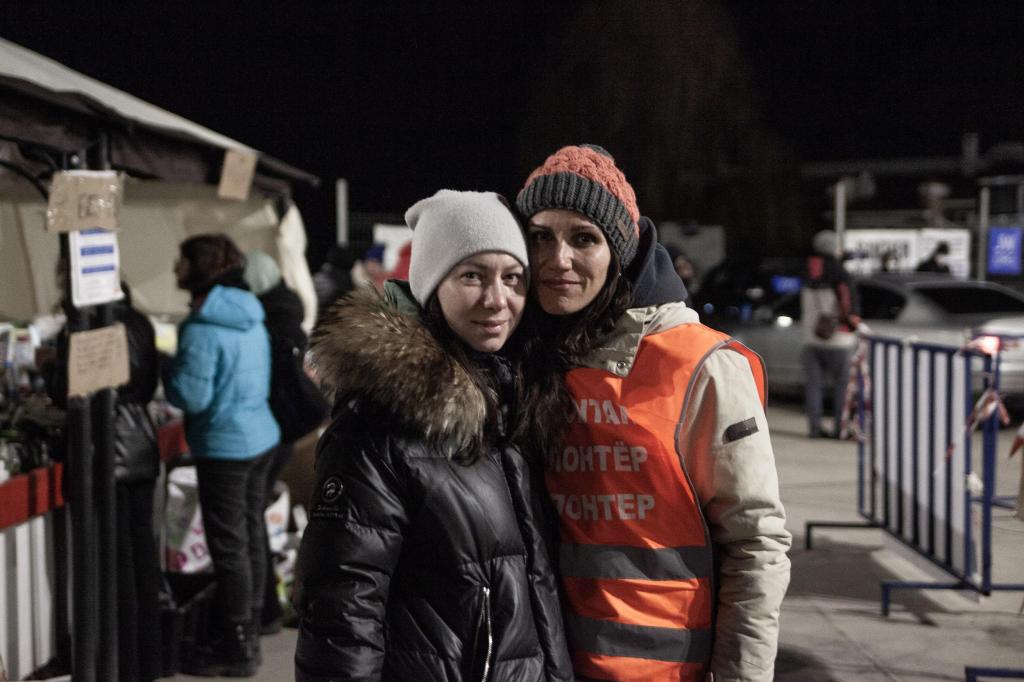We slam the trunk of our van and hit the road toward Bucharest. We’ll spend the night and continue east toward the border with Ukraine tomorrow morning. I’m lucky to have friends who are up for most anything at a moment’s notice. It was just yesterday we started discussing a trip to one of the refugee camps on the Romania-Ukraine border. Now we’re on our way.
Only a few weeks earlier, I’d been on a bus heading toward our region’s immigration office when I learned that the war had started. As an American expat, I needed to renew my Romanian visa, and now, the unimaginable has happened. On the TVs in the office, the bombarded apartment blocks look just like where I’ve been living the past four years.
Since the war in Ukraine began, it’s been unsettling trying to go about life as normal.

While day-to-day activities continue relatively undisturbed by the chaos unfolding over the border, when I see footage of bombed neighborhoods or families crossing the borders into countries foreign to them, or civilians suddenly turning into soldiers, I am overwhelmed by this unshakeable awareness: It could be us.
The day before my friends and I leave for the border, the Ukrainian president Volodymyr Zelenskyy offered this grave encouragement to protesters in Europe: “Do not be silent. Support Ukraine. Because if Ukraine does not survive, the whole of Europe will not survive. If Ukraine falls, the whole of Europe will fall.”
The place and circumstances into which you are born can make all the difference in the world in times like these. While Romanian officials reassure the public that Romania is not likely to be under direct attack anytime soon, there is still an overwhelming sense among the population that anything is possible.
Many people start to prepare in case of power outages or food shortages. We fill empty bottles with tap water and pack bags we can grab and go if the need arises. And I’m sure I’m not the only one who pulled open the door to my apartment block’s basement to make sure that it was unlocked and accessible.
Romanians are risking their own safety to help their neighbors in Ukraine.
Ukraine is big enough that it wraps around Moldova, our Romanian-speaking neighbors, and thus shares two separate borders with Romania: a sizable one to the north and a smaller, nearly forgotten one to the east, 300 kilometers away from Odessa. It is toward this smaller border that we are heading.
Our contact in Tulcea is the pastor of a Baptist church who has become heavily involved in working with refugees at the border crossing in Isaccea. We drop off some money to him that was raised by one of the churches in our valley, and he directs us toward the biggest needs that we might work toward fulfilling.
Pastor Adrian Dordea and his wife Lidia explain the situation at the border. The vast majority of refugees are in transit toward other countries and some toward other regions of Romania, so there is a constant flow of people that need housing, transportation and basic provisions. They tell us that hundreds of people arrive on a single ferry—sometimes upwards of 700 refugees arriving at one time. The majority come on foot, either abandoning their cars on the side of the road before reaching the border, or not having one to begin with.
When the refugees arrive, many are quite nervous or afraid of what awaits them in this foreign country. Many do not speak English, let alone Romanian. Many are women who are traveling alone or with their children. And, as Dordea explains, unfortunately their fears are not unfounded. Human trafficking is a major issue in wartime, and there have already been reports of people disappearing. For this reason, all the organizations involved at the border are striving for complete transparency. Nothing is done without the knowledge of the local authorities, and personal data of both refugees and volunteers is meticulously recorded.
The church is housing refugees in transit at several locations, offering them a warm place to stay, a hot meal and money for the road. They help coordinate the refugees’ journeys onward and they send volunteers to man tents at the border. They are starting to send missions across the border, bringing blankets and food to the hundreds waiting in line to cross into Romania, or even rescuing people from Odessa who are unable to make the journey alone. It is apparent that they are exhausted by the sheer amount of work to be done. The pastor shrugs modestly, explaining in the simplest possible terms, “We help with what we can.”
Romanians are using social media platforms like Facebook to organize relief efforts.

And they’re not the only ones. When we get to the border, we’re handed bright vests by the previous shift of volunteers and they show us how to manage the provisions tents. They are eager to leave to get some rest, as several of them only got three hours of sleep the night before. Most of them have travelled here from Bucharest. Nearly all of them were strangers before they got connected online, united by the simple desire to do something to help.
“Facebook mobilizes,” one of them tells me. There is a Romanian/Ukrainian Facebook group called Uniti Pentru Ucraina (United for Ukraine) that has burgeoned into more than 250,000 members in less than two weeks. Every day, hundreds of people share resources and information, ask for advice and for help, or offer up empty apartments or rooms to anyone in need. Some posts are merely congratulatory: Ukrainians thanking the Romanians that opened their hearts and homes, or Romanians expressing a regained sense of pride in their own country and the ways their fellow citizens have stepped up to the present situation. In the words of one Romanian poster: “We may not be rich, we may not even be the most civilized, but we share our bread with those in need, and that is more noble than anything.” Motivated by a collective weight of responsibility, as Ukrainians rush to the borders of Romania, Romanians are rushing there too.
My friends and I get to work, giving people tea, coffee, sandwiches, snacks and sweets; toiletries and baby formula; pet carriers and collars; blankets, scarves, gloves and socks; SIM cards and stuffed animals. We are told to encourage people to take as much of whatever they want and to reassure them that it’s all free. Translators bring the refugees to the large, enclosed tents where they can sit down and warm up and talk to someone about their plan, if they have one.
As simple as my job is, it’s overwhelmingly emotional in the first several minutes. It feels surreal and absurd to be handing bags full of cookies, fruit and canned meats to children who have just fled a war zone. How can this be real? But I do my best to smile with them, and soon my mind begins to come to terms with this new reality.
I don’t know at first how to speak with the women. I’m almost embarrassed to ask “how are you?” but I start to realize they are glad for an opportunity to share at least a small part of their stories. Two young women tell me that they waited 30 hours to cross the border. A mother shares that she is here with her 4-year-old daughter who will turn 5 very soon. She had been planning a big party for her, but now here they are. She doesn’t know where she will go. “Most people are wanting to go on to other countries, to Germany or to Poland,” she told me, “but I just want to go home to Ukraine. Every few hours we call our men. We are worried for them, and they are worried for us.” We both shake our heads in disbelief of the life that she is now living.
It’s getting dark when another woman comes to get a sandwich and a tea. Even with limited English, she is anxious to tell us something. “I have a son who is…” she pauses, smiling apologetically as she reviews the numbers in English in her head, counting up from one to… “fourteen. Fourteen years old. I tried to tell him to come with me, but he said ‘no, I am a patriot. I will not leave my country.’” She nods her head with a melancholy sort of pride. “He is a patriot.”
Even when I cannot talk to the people who come for provisions, I feel an overwhelming sense of camaraderie with them all. Oftentimes the only words exchanged are “спасибі” (thank you) and “you’re welcome,” or sometimes we just both place our hands on our hearts and look briefly into each other’s eyes; we know everything that the other wants to say.
When my friends and I leave the camp in the middle of the night, we are no longer thinking “It could be us,” but rather, “It is us.” The borders are dissolving. We are standing side by side and we are connected in more ways than we know.
These hundreds and thousands of souls who have left their homes and crossed borders into unknown places are not engaging in an act of retreat. They are advancing into the rest of Europe, carrying their stories, their resilience and a deep love for their country into the hearts and homes of their neighbors. And around them, all of Europe, and indeed the entire world, unites for their cause.
It is a different kind of front line, but one just as necessary. Ukraine will not fall—it is being fortified in this collision of humanity, and we can be sure that if Ukraine rises, the whole of Europe will rise too.






























